Cortisol Imbalance in Co-Dependency: How Supplements Can Help
Introduction
If you live with patterns of co-dependency, you probably know the feeling of being constantly “on edge.” Your body rarely feels relaxed—even when everything looks calm on the outside. You might overthink every text, replay conversations, or feel emotionally responsible for others’ moods. Deep down, your nervous system is doing exactly what it was trained to do: protect you from disconnection.
But the cost of that hypervigilance is high. Over time, chronic stress leads to cortisol imbalance, which can cause fatigue, anxiety, irritability, and even burnout. Your body becomes locked in survival mode, unable to fully rest.
The good news is that with awareness, lifestyle changes, and the right nutritional support, it’s possible to restore hormonal balance—and reclaim your emotional and physical energy. This article explores how cortisol imbalance develops in co-dependency and how specific supplements and adaptogens can help you recover your calm, boundaries, and vitality. 🌙
Looking for supplements for This? Click here.
Understanding Cortisol and the Stress Cycle 🧠⚡

Cortisol is the body’s main stress hormone. Produced by your adrenal glands, it helps you stay alert, regulate blood sugar, and respond to danger. In short bursts, cortisol is helpful—it helps you think clearly and act fast.
But when you’re constantly anxious or emotionally overextended (as many co-dependent people are), cortisol never fully drops. The body stays flooded with stress signals even when no threat is present.
This leads to HPA axis dysregulation—a breakdown in communication between your brain (hypothalamus and pituitary) and your adrenals. Instead of following a healthy rhythm (high in the morning, low at night), cortisol becomes erratic—too high when you should rest, too low when you need energy.
Symptoms of cortisol imbalance often include:
💭 mental fog or difficulty concentrating
🌙 insomnia or restless sleep
💓 heart palpitations or anxiety
😣 irritability or emotional volatility
💧 fatigue that doesn’t improve with rest
🍫 cravings for sugar or caffeine
In co-dependency, these symptoms are often mistaken for “just being emotional.” But what’s really happening is biochemical exhaustion—your body is stuck in protection mode.
Co-Dependency and Chronic Stress: The Perfect Storm 💔
Co-dependency isn’t just a relationship pattern—it’s a nervous system adaptation to emotional instability. When love or safety once felt conditional, your brain learned to stay on alert to keep connection intact.
That constant alertness—watching others’ moods, predicting needs, avoiding conflict—creates a biochemical loop of stress. Even small relational shifts can feel like danger.
Cortisol rises. Adrenaline spikes. Heart rate quickens. You go into fight, flight, or fawn—people-pleasing to avoid tension.
Over time, this cycle wears out the adrenal glands. Cortisol either remains chronically elevated (causing anxiety, restlessness, and insomnia) or drops too low (leading to exhaustion, apathy, and depression).
This is what many call adrenal fatigue or HPA axis dysfunction—and it’s extremely common among those healing from emotional overfunctioning.
How Cortisol Affects Emotions 🌙
Cortisol doesn’t just regulate energy—it also affects emotion and cognition. Chronic high cortisol disrupts neurotransmitters like serotonin, dopamine, and GABA, leading to mood swings, anxiety, and intrusive thoughts.
When cortisol stays elevated, the amygdala (your brain’s fear center) becomes hypersensitive. You perceive small emotional signals as threats. Simultaneously, the prefrontal cortex—the rational, decision-making part—gets suppressed.
This makes emotional regulation harder. You might intellectually know you’re safe, but your body doesn’t believe it.
On the other end of the spectrum, low cortisol can make you feel emotionally flat or unmotivated—like you’re too tired to care or respond. That emotional numbness is often mistaken for laziness, but it’s really your body conserving energy after years of overactivation.
Restoring balance means teaching your body that safety doesn’t depend on constant vigilance—and that calm is allowed. 🌿
The Biochemistry of Burnout ⚙️
When your cortisol pattern has been dysregulated for months or years, the entire hormonal orchestra gets thrown off balance.
🔥 Elevated cortisol suppresses thyroid hormones—causing fatigue and low mood.
💫 It raises blood sugar, leading to energy crashes and cravings.
🧠 It interferes with serotonin and dopamine, contributing to anxiety and rumination.
💧 It suppresses melatonin, disrupting sleep.
Eventually, your body adapts by lowering cortisol production altogether, which can lead to burnout. This state of “flatline” is often accompanied by brain fog, exhaustion, and emotional detachment—a biological mirror of emotional depletion.
Supplements That Support Cortisol Balance 🌿💊
The body has an incredible ability to heal once it’s given the right tools. Supplements can help regulate cortisol naturally by supporting adrenal function, improving stress resilience, and restoring nervous system calm.
Here are some of the most effective options backed by research:
Ashwagandha: The Cortisol Whisperer 🌸
One of the best-studied adaptogens for cortisol regulation, Ashwagandha (Withania somnifera) helps bring the stress response back to equilibrium.
It works by:
🌿 lowering elevated cortisol levels
🌿 enhancing resilience to emotional stress
🌿 improving sleep and reducing anxiety
🌿 stabilizing thyroid and adrenal function
In one study, Ashwagandha reduced cortisol levels by up to 30% in chronically stressed adults. It’s ideal for those who feel constantly anxious, overworked, or unable to relax.
For co-dependent individuals, Ashwagandha can help calm emotional reactivity and reduce the physical symptoms of worry—racing heart, tense muscles, shallow breathing—so you can think clearly and set healthy boundaries.
Looking for supplements for This? Click here.
Rhodiola Rosea: The Resilience Root 🌿
Rhodiola is another powerhouse adaptogen that helps the body adapt to emotional and physical stress.
Rather than sedating, it energizes your system in a balanced way—making it perfect for people who feel emotionally drained yet restless.
Benefits include:
💫 restoring healthy cortisol rhythm
💫 boosting dopamine and serotonin
💫 improving mood, focus, and endurance
💫 reducing mental fatigue
Rhodiola helps your nervous system find the “middle ground”—alert without anxiety, relaxed without fatigue.
This emotional stability makes it easier to detach from co-dependent habits of control or over-caretaking.
Magnesium: The Nervous System Soother 🌙
Magnesium is one of the most crucial nutrients for calming the stress response. It regulates cortisol secretion, supports GABA production, and helps muscles and nerves relax.
Chronic stress depletes magnesium rapidly—especially when cortisol and adrenaline are high. Supplementing can help you:
🌿 sleep deeper
🌿 ease tension headaches or tight muscles
🌿 reduce anxiety and irritability
🌿 prevent burnout-related fatigue
For best results, look for magnesium glycinate or magnesium threonate, which are gentle and highly bioavailable.
Phosphatidylserine: The Cortisol Buffer 🧬
Phosphatidylserine (PS) is a phospholipid naturally found in brain cell membranes. It plays a vital role in signaling when the body should shut off its stress response.
By lowering excessive cortisol, PS helps:
💭 calm mental overactivity
💤 improve sleep quality
🌙 enhance focus under pressure
It’s especially useful for those who experience “wired but tired” energy—alert at night, sluggish in the morning.
PS works beautifully in combination with adaptogens like Ashwagandha for a balanced approach to stress regulation.
B Vitamins: Rebuilding Energy and Focus 💊
The B-complex vitamins (particularly B5, B6, B12, and folate) are essential for adrenal health and neurotransmitter balance.
Stress depletes them quickly, leaving you more vulnerable to mood swings and fatigue. Supplementing can help rebuild:
🌞 steady energy
🌸 balanced mood
💫 improved stress tolerance
Vitamin B6, in particular, supports serotonin and GABA synthesis—two neurotransmitters that calm the mind and help you feel emotionally safe from within.
Omega-3 Fatty Acids: Calming Inflammation and Stress 🌊
Chronic stress and elevated cortisol cause neuroinflammation, which worsens anxiety and depression. Omega-3s (EPA and DHA) counteract this by reducing inflammation and supporting healthy brain cell membranes.
They also improve cortisol rhythm and reduce reactivity to stress.
Regular supplementation with fish oil or algae-based omega-3s has been shown to:
🌿 lower anxiety
🌿 improve emotional regulation
🌿 support serotonin and dopamine production
Omega-3s help you feel less emotionally hijacked—able to stay compassionate without absorbing others’ emotions.
Vitamin C: The Adrenal Ally 🍊
The adrenal glands contain one of the highest concentrations of vitamin C in the body. During chronic stress, vitamin C levels drop dramatically.
Supplementing supports cortisol recovery by:
🍊 reducing oxidative stress
🍊 restoring adrenal function
🍊 improving immune health and energy
Vitamin C works synergistically with magnesium and B vitamins, forming a strong foundation for adrenal repair.
L-Theanine and GABA: Calming the Storm 💆
Both L-Theanine (from green tea) and GABA (a calming neurotransmitter) help regulate the brain’s stress circuits directly.
They reduce cortisol spikes and support alpha brain waves—the calm, focused state associated with mindfulness.
Together, they create a “relaxed alertness” that’s ideal for emotional boundary-setting. You stay calm and centered even when others around you are reactive.
Looking for supplements for This? Click here.
Restoring Balance: The Lifestyle Connection 🌞
Supplements can’t do the work alone—they’re most effective when paired with daily habits that retrain your body to feel safe again.
Here’s how to support cortisol recovery naturally:
🌿 Morning sunlight: Helps regulate your cortisol awakening response. Step outside for 5–10 minutes after waking.
🧘 Breathwork and meditation: Activates the vagus nerve, calming the stress response. Try slow exhales to signal safety.
Want to try Breathwork? Click Here.
🍲 Stable meals: Avoid skipping meals—balanced blood sugar keeps cortisol steady.
🌙 Regular sleep schedule: Go to bed and wake up at consistent times to reprogram your hormonal rhythm.
💬 Emotional boundaries: Saying “no” when needed lowers emotional overload and keeps your nervous system from staying in fight-or-flight.
These habits help reinforce the biochemical support of your supplements, creating a full-circle approach to healing.
Looking for online therapy ? Click Here.
The Phases of Healing: From Survival to Stability 🌿
Healing cortisol imbalance is not instant—it unfolds in stages.
Phase 1: Awareness
You begin noticing how stress patterns affect your body. The goal here is gentle observation, not correction.
Phase 2: Restoration
Supplements, rest, and nutrition begin to rebuild your reserves. You feel subtle improvements in mood and energy.
Phase 3: Regulation
Your nervous system learns balance. You start responding rather than reacting. Sleep, digestion, and emotions stabilize.
Phase 4: Independence
You feel emotionally strong, self-aware, and less reactive to others’ moods. Calm becomes your default—not something you chase.
What Healing Looks Like 💛
Over time, you might notice:
🌸 You no longer wake up with racing thoughts.
🌙 You sleep deeply and wake with energy.
💭 You feel calm even during uncertainty.
💓 Your heart rate stays steady during conflict.
💫 You can care for others without losing yourself.
These are signs that your cortisol rhythm is recovering—and that your nervous system is finally learning safety again.
Supplements as Tools for Empowerment 🌿
Healing cortisol imbalance through supplementation isn’t just about fixing a hormone; it’s about rebuilding trust with your body. When you support your biochemistry, you create a foundation for emotional growth.
With balanced cortisol, your mind becomes clear enough to reflect, your body calm enough to rest, and your heart strong enough to set boundaries.
Supplements aren’t a replacement for therapy or self-awareness—but they help create the inner environment where healing becomes possible.
Final Thoughts 🌸
Co-dependency keeps the body in a state of emotional emergency. But healing begins when you stop outsourcing safety and start rebuilding it from within.
Balancing cortisol is one of the most powerful ways to reclaim that inner stability. With the help of adaptogens, nutrients, and lifestyle practices, your body can finally exhale.
As your stress hormones find balance, your relationships follow. You begin to feel safe in your own company, clear in your communication, and grounded in your choices.
And that’s what real independence feels like—peace, not pressure. 🌿💛
Looking for online therapy ? Click Here.
References 📚
Chandrasekhar, K. et al. (2012). A prospective, randomized double-blind, placebo-controlled study of Ashwagandha in reducing stress and anxiety. Indian Journal of Psychological Medicine.
Panossian, A., & Wikman, G. (2010). Effects of adaptogens on the central nervous system and molecular mechanisms of stress protection. Pharmaceuticals.
Pickering, G. et al. (2020). Magnesium and stress: A vicious circle. Biological Trace Element Research.
Porges, S. W. (2011). The Polyvagal Theory: Neurophysiological Foundations of Emotions, Attachment, Communication, and Self-Regulation.
Sapolsky, R. M. (2004). Why Zebras Don’t Get Ulcers. Henry Holt & Company.
Related Posts
-

Omega-3s and Parkinson’s: Supporting Mood and Cognitive Clarity
Omega-3 fatty acids are among the most powerful nutrients for supporting brain health and emotional well-being in people with Parkinson’s. 🧠 This article explores how omega-3s strengthen neuronal membranes, improve dopamine and serotonin signaling, reduce inflammation, and promote cognitive clarity. Learn how these essential fats can help ease anxiety, lift mood, and protect your mind from oxidative stress naturally. 🌿
-
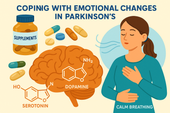
Coping with Emotional Changes in Parkinson’s: Supplements That Support Balance
Emotional changes like anxiety, depression, and irritability are common yet often overlooked symptoms of Parkinson’s disease. This article explores how supplements such as omega-3s, magnesium, and vitamin D can support mood regulation, while therapy and breathwork techniques help restore calm and emotional balance naturally. 🌿
-
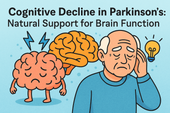
Cognitive Decline in Parkinson’s: Natural Support for Brain Function
Cognitive decline in Parkinson’s can affect memory, focus, and daily independence—but there’s hope. Understanding how the disease impacts brain chemistry opens the door to natural ways of support. From omega-3s and CoQ10 to mindfulness and exercise, you can nourish your brain, boost clarity, and slow decline through holistic care. 🌿🧠
-
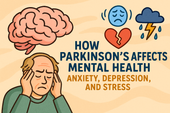
How Parkinson’s Affects Mental Health: Anxiety, Depression, and Stress
Dopamine is the brain’s spark of motivation—the chemical that fuels focus, pleasure, and drive. When dopamine levels are balanced, you feel inspired and alive; when they’re low, everything feels like an uphill climb. Understanding how dopamine works can help you support mental clarity, resilience, and emotional balance naturally. ⚡🧠
-
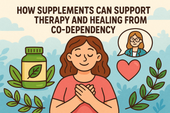
How Supplements Can Support Therapy and Healing from Co-Dependency
Biology is the science of life—an exploration of how cells, systems, and molecules create the foundation for every thought, emotion, and heartbeat. From the way our DNA shapes us to how hormones and neurons communicate, biology reveals the deep interconnectedness between mind and body. Understanding it helps us appreciate the delicate balance that keeps us alive, aware, and evolving. 🌿🧬
-
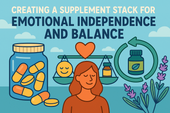
Creating a Supplement Stack for Emotional Independence and Balance
Biochemistry is the invisible language of life—how molecules, cells, and systems communicate to keep your body and mind in balance. From neurotransmitters shaping emotions to enzymes fueling energy, every process in your body reflects biochemical harmony. Understanding these reactions helps you see how nutrition, supplements, and emotions intertwine to support health, mood, and resilience. ⚗️🌿
-
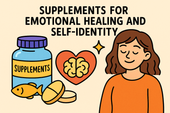
Supplements for Supporting Emotional Healing and Self-Identity
Biology is the bridge between mind and body—the science that explains how cells, hormones, and systems communicate to sustain life. It reveals how emotional states influence physical health, and how nourishment, rest, and movement keep us in balance. Understanding biology helps us reconnect with our natural intelligence and live in harmony with ourselves and the world. 🌿🔬
-
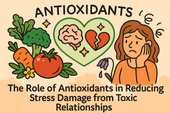
The Role of Antioxidants in Reducing Stress Damage from Toxic Relationships
Biology is the study of life in motion—the intricate dance between cells, systems, and the natural world. From DNA replication to neurotransmitter flow, every process in the human body reflects the intelligence of life adapting and evolving. Understanding this harmony helps us appreciate how nutrition, stress, and environment shape our health and emotional balance. 🌿🔬
-
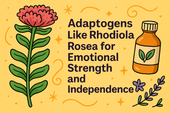
Adaptogens Like Rhodiola Rosea for Emotional Strength and Independence
Adaptogens are nature’s stress-balancing herbs—plants like Rhodiola, Ashwagandha, and Holy Basil that help your body adapt to emotional and physical pressure. They don’t numb or overstimulate; they teach your system how to find calm and stability again. By restoring balance to your hormones, energy, and mood, adaptogens nurture emotional resilience and grounded strength. 🌿✨
-
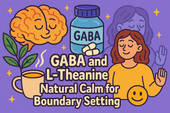
GABA and L-Theanine: Natural Calm for Boundary Setting
Anxiety can feel like a storm inside your mind—constant tension, overthinking, and the inability to relax even when you’re safe. But beneath the chaos, your body is simply trying to protect you. Learning to calm anxiety starts with understanding how your brain and nervous system respond to stress—and how to gently guide them back to peace. 🌿💫
-
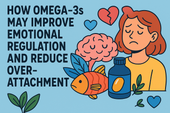
How Omega-3s May Improve Emotional Regulation and Reduce Over-Attachment
Inflammation isn’t just about sore joints or fatigue—it’s also a hidden driver of mood swings, anxiety, and emotional burnout. When chronic stress or poor diet keep the body inflamed, the brain’s chemistry changes, making calm harder to access. Learning how to reduce inflammation through nutrition, rest, and mindful living helps restore balance from the inside out. 🌿💫
-
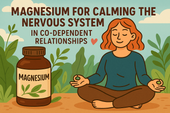
Magnesium for Calming the Nervous System in Co-Dependent Relationships
The nervous system is the body’s communication network, linking your mind and organs through a delicate web of electrical signals. It controls everything from emotional responses to muscle movement—and when it’s overwhelmed by chronic stress or anxiety, balance is lost. Learning how to calm and nourish your nervous system through nutrition, mindfulness, and rest can restore peace and emotional stability. 🌿💫
-
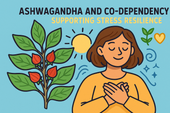
Ashwagandha and Co-Dependency: Supporting Stress Resilience
Stress is more than a feeling—it’s a full-body signal that your system is overwhelmed. When the mind races and the body tenses, your hormones, breathing, and focus all shift into survival mode. Chronic stress doesn’t just affect emotions—it reshapes your nervous system, drains your energy, and clouds your clarity. Learning to understand and manage stress gently is the first step toward peace, balance, and true recovery. 🌿💫
-

Why Co-Dependency Feels Draining: Adrenal Fatigue and Supplements That Help
The adrenal glands are small but powerful organs that sit above your kidneys, acting as your body’s built-in stress managers. They produce hormones like cortisol and adrenaline that help regulate energy, mood, and resilience. When they’re overworked from chronic stress or emotional exhaustion, fatigue and imbalance follow. Supporting adrenal health naturally can help restore calm, energy, and hormonal balance. 🌿⚡
-

The Link Between Anxiety, Co-Dependency, and Natural Support
Anxiety feels like living in constant alert mode—your heart races, your thoughts loop, and your body can’t find peace. It’s the nervous system’s way of preparing for danger, even when none exists. Understanding what’s happening in your mind and body is the first step toward calming the storm and restoring balance. 🌿💫
-

Supplements That Support Dopamine and Serotonin in Co-Dependent Patterns
Serotonin is the neurotransmitter of calm, confidence, and contentment. When it’s balanced, you feel peaceful and emotionally grounded. When it’s low, anxiety, mood swings, and emotional dependence take over. By understanding serotonin’s role in emotional health—and how to support it naturally—you can rebuild inner stability, improve relationships, and cultivate lasting happiness from within. 🌞💫
-

How Emotional Exhaustion in Codependency Impacts the Nervous System
The nervous system is the body’s communication network, connecting the brain to every organ and muscle. It regulates stress, mood, and emotion through a delicate balance of electrical and chemical signals. When overwhelmed, it can become dysregulated—leading to fatigue, anxiety, and emotional imbalance. Understanding how to calm and strengthen the nervous system is key to healing from chronic stress and emotional burnout. ⚡🌿
-

What Is Co-Dependency? The Role of Brain Chemistry and Stress
Stress is more than a feeling—it’s a full-body experience that begins in the brain and ripples through every cell. When cortisol surges and the nervous system stays on alert, your body can’t rest or recover. Over time, this constant tension affects energy, focus, mood, and even immune health. Understanding stress chemistry is the first step toward breaking free from burnout and finding calm again. 🌿
-

Creating a Supplement Stack for Motivation, Energy, and Anti-Procrastination
Motivation is the fuel behind every meaningful achievement—but it’s not just about willpower. It’s a mix of mindset, brain chemistry, and momentum. When energy, focus, and purpose align, action feels natural instead of forced. Learn how to harness motivation as a daily state, not a fleeting feeling.
-

Supplements for Building Consistency and Reducing Chronic Procrastination
Biochemistry is the bridge between biology and chemistry—the science of life at the molecular level. It explains how nutrients, hormones, and neurotransmitters interact to create energy, thought, and emotion. From brain function to muscle movement, biochemistry reveals the invisible processes that sustain health, balance, and vitality.
-

GABA and Procrastination: Supporting Calm Focus for Productivity
GABA is the brain’s natural calming messenger—a neurotransmitter that helps slow mental overactivity and ease stress. When GABA levels drop, focus fades, anxiety rises, and procrastination becomes more likely. By supporting GABA through nutrition, lifestyle, and supplements, you can restore calm clarity, improve focus, and take action with steady, balanced energy.
-

Ashwagandha and Procrastination: Lowering Stress to Improve Action
Science is the language of curiosity and discovery. It helps us understand the hidden patterns behind life, energy, and the universe. Through experimentation and critical thinking, science connects imagination to evidence—turning questions into knowledge. Whether through microscopes, molecules, or minds at work, science represents our endless pursuit of truth and innovation.
-

Neurotransmitters and Motivation: Supplements That Support Drive and Focus
Supplements can do more than boost physical health—they can also enhance mental clarity, focus, and motivation. Nutrients like omega-3s, magnesium, B vitamins, and adaptogens help balance neurotransmitters, stabilize mood, and support brain energy. When combined with good sleep, nutrition, and mindful habits, they can transform how your brain performs under stress.
-

How Stress Hormones Like Cortisol Fuel Procrastination (and What Helps)
Blood sugar isn’t just about physical health—it directly impacts focus, mood, and motivation. When glucose levels spike and crash, energy and attention do the same, fueling procrastination and brain fog. Learning how to stabilize blood sugar through balanced meals, mindful habits, and key nutrients helps keep your mind steady, focused, and ready to act.
-

Brain Fog and Procrastination: Supplements for Mental Clarity
Brain fog can turn even simple tasks into mental hurdles. When your thoughts feel slow and unclear, procrastination often follows—making focus and productivity seem impossible. This article explores the biochemical and lifestyle causes of brain fog and reveals the most effective supplements for restoring mental clarity, focus, and sustained energy.
-

The Link Between Low Energy and Procrastination: Can Supplements Help?
Neurochemistry shapes how we think, feel, and act. When neurotransmitters like dopamine, serotonin, and GABA fall out of balance, it can lead to fatigue, anxiety, or lack of motivation—fueling procrastination and low mood. Understanding the brain’s chemical communication system helps us find ways to restore focus, calm, and emotional stability through nutrition, mindfulness, and targeted supplements.
-

Why Do We Procrastinate? The Role of Dopamine and Supplements That Support It
Dopamine is the brain’s motivation messenger—the chemical that fuels focus, reward, and drive. When dopamine levels drop, even simple tasks can feel impossible to start. This article explores how dopamine shapes procrastination, motivation, and mental energy, along with natural supplements and daily habits that help restore balance and get things done.
-

Phosphatidylserine and Stress Reduction for People with BDD
Stress is more than a mental state—it’s a full-body experience that affects hormones, brain chemistry, and emotional balance. For people with Body Dysmorphic Disorder (BDD), constant tension and worry about appearance can overload the nervous system. Learning how stress works and finding ways to calm it is key to breaking the cycle of anxiety and self-criticism.
-

How Antioxidants Like Vitamin C & E Support Mental Health in BDD
Antioxidants are the body’s natural defense against stress and inflammation. For people with Body Dysmorphic Disorder (BDD), oxidative stress can worsen fatigue, anxiety, and emotional imbalance. Nutrients like Vitamin C and E help protect brain cells, boost neurotransmitter function, and support a calmer, clearer mindset—building a stronger foundation for recovery.
-

Ginkgo Biloba and Memory Support for BDD Recovery
Emotional regulation is the foundation of healing from Body Dysmorphic Disorder (BDD). When the nervous system stays in constant overdrive, even small stressors can trigger self-critical spirals. Learning to calm emotional reactivity helps restore clarity, confidence, and a sense of inner balance. By blending mindfulness, nervous system support, and self-compassion, you can retrain your brain to respond—not react—to emotion.
-

Alpha GPC and Cognitive Function in Body Dysmorphic Disorder
Mental fatigue can feel like your brain has hit a wall—thoughts slow down, focus fades, and motivation disappears. For people with Body Dysmorphic Disorder (BDD), chronic overthinking, emotional stress, and constant self-evaluation can deplete mental energy even further. Understanding what causes this cognitive exhaustion is the first step toward recovery—through rest, balanced nutrition, and targeted brain-supporting supplements.
-

N-Acetyl L-Tyrosine and BDD: Supporting Mental Clarity
Chronic stress doesn’t just affect your mood—it reshapes your brain chemistry, weakens focus, and fuels the obsessive thought loops common in Body Dysmorphic Disorder (BDD). Over time, constant cortisol elevation drains mental energy and emotional balance. Learning to recognize and manage chronic stress is essential to restoring mental clarity, self-compassion, and resilience.
-

Chamomile and Lavender for Calming Obsessive Body Image Thoughts
The nervous system is the command center of our emotional and physical world—and in Body Dysmorphic Disorder (BDD), it often operates in overdrive. Understanding how the brain and body communicate under stress reveals why intrusive thoughts feel uncontrollable. Learning to regulate the nervous system through calm practices, nutrition, and supplements helps restore inner balance and emotional safety.
-

Adaptogens for Body Dysmorphic Disorder: Rhodiola, Ginseng, and More
Rhodiola rosea, often called the “golden root,” is an adaptogenic herb renowned for boosting stress resilience and mental endurance. For individuals with Body Dysmorphic Disorder (BDD), Rhodiola may help reduce fatigue, regulate cortisol, and enhance emotional balance. By supporting both mind and body, this powerful plant promotes calm focus, improved mood, and renewed energy to face daily challenges.
-

B Vitamins for Stress Resilience in BDD: Rebuilding Calm from Within
Biochemistry is at the heart of every thought, emotion, and reaction we experience. In Body Dysmorphic Disorder (BDD), chemical imbalances in neurotransmitters like serotonin, dopamine, and GABA can amplify stress and distort self-perception. Understanding the biochemistry behind mood and stress regulation offers a path toward healing—bridging the gap between emotional experience and the body’s molecular balance.
-

Melatonin and Body Dysmorphic Disorder: Restoring Healthy Sleep Patterns
Melatonin, the body’s natural sleep hormone, plays a vital role in helping people with Body Dysmorphic Disorder (BDD) restore healthy sleep cycles. When anxiety and obsessive thinking interfere with rest, melatonin levels often drop, leading to more emotional reactivity and distorted self-perception. This article explores how melatonin works, why BDD disrupts it, and how natural supplementation—combined with mindful routines—can help the brain and body finally find calm at night.
-

Sleep Struggles with BDD: Supplements for Rest and Recovery
When you’re living with Body Dysmorphic Disorder (BDD), restful sleep can feel impossible—but the right supplements can help reset your body’s natural rhythm. From magnesium and L-theanine to 5-HTP and ashwagandha, these nutrients support relaxation, lower cortisol, and enhance melatonin production. This article explores how supplements can calm the mind, ease nighttime anxiety, and promote true restorative sleep for emotional and physical recovery.
-

5-HTP and Serotonin Balance: Could It Help with Body Dysmorphic Disorder?
Anxiety can feel like a storm inside the mind—restless, overwhelming, and hard to control. In people with Body Dysmorphic Disorder (BDD), anxiety often fuels obsessive thoughts and self-criticism, creating a painful cycle of worry and self-doubt. This article explores the biological roots of anxiety, the role of neurotransmitters like serotonin and GABA, and how natural strategies such as mindfulness, supplements, and nervous system regulation can restore calm and mental clarity.
-

Can Ashwagandha Help Ease Stress and Anxiety in Body Dysmorphic Disorder?
Neurotransmitters like serotonin, dopamine, GABA, and acetylcholine are the chemical messengers that shape how we think, feel, and react to stress. In Body Dysmorphic Disorder (BDD), imbalances in these neurotransmitters can amplify anxiety, obsessive thinking, and emotional distress. This article explores how restoring healthy brain chemistry through nutrition, supplements, and mindfulness can help bring clarity, calm, and emotional stability.
-

L-Theanine for BDD: Finding Calm in the Mind
Neurochemistry plays a central role in how we think, feel, and see ourselves. For those living with Body Dysmorphic Disorder (BDD), imbalances in neurotransmitters like serotonin, dopamine, and GABA can intensify anxiety, obsessive thoughts, and emotional distress. This article explores how regulating brain chemistry through supplements, mindfulness, and lifestyle changes can bring the nervous system back into harmony and restore inner calm.
-

Omega-3 Fatty Acids and Body Image Disorders: Supporting Emotional Health
Omega-3 fatty acids do far more than support heart health—they nourish the brain, stabilize mood, and may ease the emotional turbulence tied to body image disorders like BDD. This in-depth article explores how omega-3s regulate serotonin, dopamine, and inflammation, helping individuals reduce obsessive thoughts and rebuild self-acceptance. It also connects nutrition to therapy, mindfulness, and nervous system balance for holistic emotional healing.
-

Magnesium and BDD: Calming an Overactive Nervous System
Magnesium plays a crucial role in calming an overactive nervous system—something people with Body Dysmorphic Disorder (BDD) struggle with daily. This article explores how magnesium supports relaxation, emotional regulation, and stress reduction while diving into the science behind its connection to brain chemistry. It also examines how combining magnesium supplementation with therapy and breathwork can help rebalance the body’s stress response, reduce obsessive thought patterns, and promote lasting nervous system calm.
-

The Gut-Brain Axis and BDD: Why Probiotics Might Matter
The gut and brain are constantly in conversation — and that dialogue may shape how you experience Body Dysmorphic Disorder. By nurturing your microbiome with probiotics, prebiotics, and gut-healing nutrients, you can help rebalance serotonin, calm anxiety, and restore emotional stability from within 🧠🦠.
-
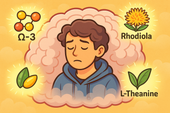
Brain Fog and Body Dysmorphic Disorder: Can Nootropic Supplements Help?
Brain fog often accompanies Body Dysmorphic Disorder, clouding focus and deepening emotional fatigue. Nootropic supplements like L-theanine, Rhodiola, and CoQ10 can help restore mental clarity, balance neurotransmitters, and bring calm energy back to the mind 🌿🧠.
-

How Stress Hormones Like Cortisol May Worsen Body Dysmorphic Disorder
Chronic stress floods the brain with cortisol — the hormone that keeps you on high alert. In Body Dysmorphic Disorder, this chemical overdrive fuels anxiety, distorts self-image, and traps the body in survival mode. Calming cortisol helps restore both peace and perspective 🌿🧠.
-

The Role of Neurotransmitters in BDD—and How Supplements May Help
Neurotransmitters like serotonin, dopamine, glutamate, and GABA shape how people with Body Dysmorphic Disorder perceive themselves. When these brain messengers fall out of balance, perception distorts — but targeted supplements can help restore calm, focus, and emotional regulation 🧠🌿.
-

What Is Body Dysmorphic Disorder? A Deeper Look at the Mind-Body Connection
Body Dysmorphic Disorder (BDD) isn’t just about appearance — it’s about perception. When brain chemistry, trauma, and stress distort self-image, the mind begins to see flaws that aren’t truly there. Healing starts by calming the nervous system and reconnecting mind and body 🪞🧠.
-
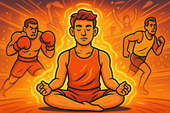
Keeping Calm in Competitive Sports: How to Train Your Mind, Body, and Chemistry for Peak Performance
Competitive pressure can overwhelm even the strongest athletes — but calm is trainable. By combining supplements like magnesium, L-theanine, and adaptogens with breathwork and mindset training, you can stay focused, balanced, and in control under any level of stress 🧠🏅.
-
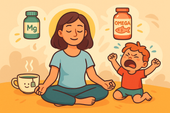
Supplements for Parents Facing Toddler Tantrums: Staying Calm When Little Emotions Run Wild
Toddler tantrums can drain even the most loving parent — but your calm is powerful. With the right supplements like magnesium, L-theanine, and ashwagandha supporting your nervous system, you can stay patient, grounded, and kind, even when emotions run high 🧸🌿.

















































